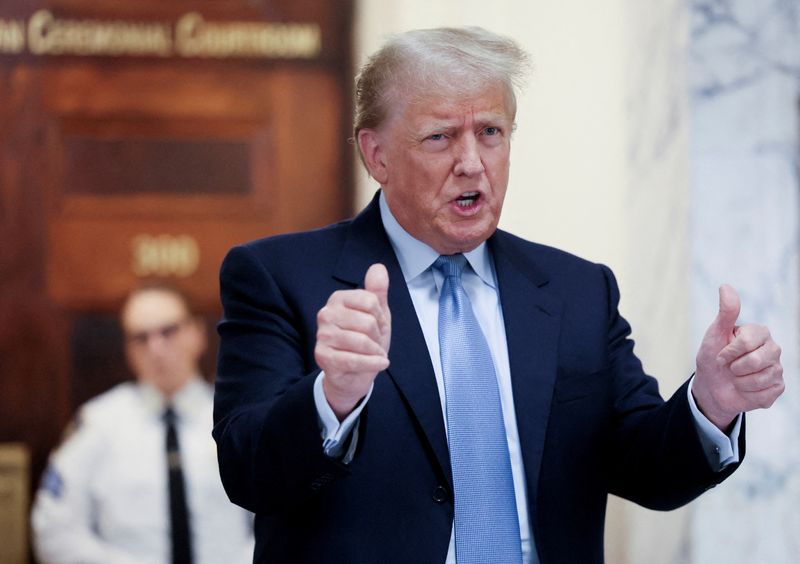By Jack Queen
(Reuters) -Former President Donald Trump could gain a strategic edge in a criminal case against him when one of his lawyers-turned-co-defendants goes on trial next week on charges he conspired to overturn the results of the 2020 U.S. presidential election.
Trial is set to kick off on Monday in Fulton County, Georgia, for Kenneth Chesebro, who was charged alongside Trump and 17 others in a sweeping racketeering case brought in August by Fulton County District Attorney Fani Willis.
Sidney Powell, another former Trump lawyer, was set to stand trial alongside Chesebro but pleaded guilty on Thursday and agreed to testify against the former president.
Trump and his co-defendants are accused of a wide-ranging scheme to reverse his 2020 election loss to Democrat Joe Biden. The former president has kept up his false claims that his defeat was the result of fraud, even as he pushes aside his rivals for the Republican nomination to challenge President Biden in 2024 despite his mounting legal troubles.
Prosecutors have said they intend to present the same case for each defendant, giving Trump's lawyers a preview of the state's playbook and a chance to fine-tune his defense for when he ultimately faces trial.
“It’s not necessarily going to make it impossible for the prosecutors, but, on balance, it is definitely better for Trump,” said former federal prosecutor Harry Sandick.
No trial date has been set for Trump, who has pleaded not guilty, as have all but two of his co-defendants.
The Georgia case is one of four federal or state criminal prosecutions Trump faces as he campaigns to retake the White House in 2024. He is also currently on trial in a civil case in New York that could dismantle pillars of his business empire.
Trump, the frontrunner for the 2024 Republican presidential nomination, has pleaded not guilty in all four cases. He has repeatedly sought to portray himself as the victim of a political witch hunt and successfully used his legal troubles to galvanize his base and elicit a flood of donations from small donors.
Chesebro's trial could provide more fodder for fundraising, while allowing Trump to hear the state's evidence in the Georgia case, including testimony from the more than 180 witnesses prosecutors say they will call.
"His lawyers will be able to observe the demeanor of witnesses, which definitely gives them an advantage in preparing their cross-examination and building their defense," said former federal prosecutor Chris Mattei.
Having staggered trials will also allow Trump to use inconsistencies between what witnesses say each time they are on the stand to attack their credibility.
Willis had sought to try all 19 defendants together but was rebuffed by Judge Scott McAffee, who said that would be unfair to defendants like Chesebro who demanded speedy trials.
But while a preview of the case could give Trump's lawyers an advantage, it might not be enough to change the outcome.
"You still have to see how the trial plays out," Mattei said.
There are also benefits to prosecutors.

Convictions in the first trial could ratchet up pressure on other defendants to strike plea deals and potentially cooperate with prosecutors. If there are several trials, convictions in each would multiply the state’s leverage.
“If you look at what one defendant did and they made all of the same arguments that you’re going to make and they still get convicted, that makes cutting a deal a lot more attractive,” Sandick said.